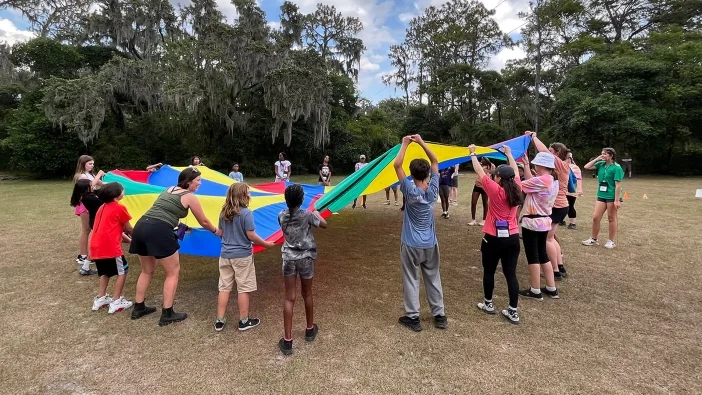Spotlight: Camp Hope
“Generally, you know, the best part about camp – [the campers] get to be around other kids their own age who have been through similar things as them and kind of can relate and then just get to be kids.” – Kevin Torigoe on the positive impact of Camp Hope
Milo stood at the edge of the dock, his heart pounding against his ribcage. It was a hot day, and the water lapped gently against the planks of the dock. Other campers were already splashing and playing with pool noodles in the water, and Milo knew it must be a relieving break from the heat but he couldn’t bring himself to jump in – he didn’t know how to swim, and even though the water was shallow enough for him to stand, it still frightened him.
Milo, like all the other children at Camp Hope, had been through some traumatic experiences. His siblings and he had been abandoned by their mother after years of a turbulent, often physically abusive relationship with their dad. Once his mom had left, she didn’t stay in touch. She called maybe once a year, but he didn’t even know where she lived any more.
His older siblings started having trouble at school and with the law. Their father had PTSD and often had a hard time holding down a job. He was so focused on keeping the older kids out of trouble that Milo often felt invisible. He didn’t want to lose any more of his family either. He understood why his father was so preoccupied, but it still hurt. Frequently, the family found themselves couch surfing at friends’ or relatives’ houses after yet another eviction. Often, they slept in their car before entering Permanent Supportive Housing through FrontLine Service. Being in stable housing once again, and participating therapy and other supportive services, gave Milo the springboard to start working through his trauma.
We recently sat down with Kevin Torigoe, Project Manager at FrontLine, who helps run Camp Hope Cuyahoga. Kevin says, “Generally, you know, the best part about camp – [the campers] get to be around other kids their own age who have been through similar things as them and kind of can relate and then just get to be kids.” He says watching campers hit milestones and have breakthroughs, coming out more confident and more resilient just over the course of a week is truly inspirational. In partnership with the Witness Victim Services & Family Justice Center, Camp HOPE America, and Camp Ho Mita Koda, Camp Hope Cuyahoga County takes place one week out of the summer and is an overnight camping experience for about 40 children each year who have been subjected to some form of trauma, whether it be abuse, poverty, homelessness, witnessing violence in their home or community, and so on.
Campers who attend have already worked with FrontLine therapists to reestablish a baseline feeling of safety and security, as well as begun to build skills for self-regulation, and have been assessed for camp-readiness before being invited to participate. Campers like Milo often come back year after year. FrontLine staff take follow-up assessments after camp, as well as before to establish data regarding program efficacy. Kevin says it’s very interesting to see the transformation kids undergo after having participated in trauma therapies and Camp HOPE for consecutive years.
Kids are put into different cabins based on age range and gender. Depending on age, camper activities vary slightly, but most campers participate in similar activities. One thing Kevin points out that he believes is really impactful for campers is the selection of a Hope Hero. This is a notable person who has also gone through trauma in their upbringing and has overcome the odds, illustrating for kids that even though difficult things can happen in life, one can still heal, grow, and experience joy, stability, and success. It helps campers understand that their trauma does not need to be the only thing that defines their life. At the nightly campfire every night, each cabin identifies a Cabin Hero or two for the day, and highlights some act of bravery, resilience, kindness or some other positive attribute and celebrates those campers with a character trait award so by the end of the week campers have also begun to learn how to focus on their strengths and the other things that make them outstanding.
Kevin, who has a lifelong love for the water, says one of his favorite things to see that builds a camper’s confidence most is learning to swim. He points out that it’s not only a useful skill to have for safety and enjoyment, but it’s incredibly empowering for kids who haven’t learned yet and by the end of the week are comfortable and confident in the water. That’s why counselors make sure to take extra time with campers who are experiencing fear about approaching a new activity, whether it’s getting comfortable in the water or overcoming a fear of heights on the ropes course or climbing walls. They take the time to help campers employ their regulation skills and help them get to a feeling of safety so they can be adventurous about trying something new. That’s what Milo’s counselor did with him on that first hot day, and by the end of the week, Milo was excitedly playing in the water and not afraid to go to the deeper end of the swimming area. Camp HOPE also conducts different outdoor day adventures throughout the year that campers may participate in, but regardless of the season stories like Milo’s are why we are dedicated FrontLiners year round!
Image via Camp HOPE America (to protect our clients, FrontLine Service does not share images or other identifying information).

